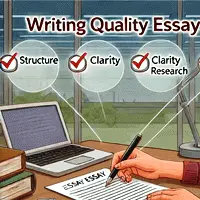 Do you want to ensure that your research paper is polished to perfection before submission? In the quest for academic success, one crucial aspect often overlooked is the meticulous editing and proofreading of your work. This is where the question arises: Why get an expert to rework your research paper for you? It's essential to recognize that even the most diligent writers can overlook errors in their own work. After investing a significant amount of time and effort into research and writing, it's common to become too close to the material, making it difficult to identify typos, grammatical mistakes, or inconsistencies. This is where the value of an editor becomes evident. Our skilled research editing professionals bring a fresh set of eyes to your paper, meticulously combing through it to identify and rectify errors that may have otherwise gone unnoticed. Hiring an expert to review your paper can significantly enhance the overall quality and clarity of your writing. Effective communication is essential in academia, and a good paper not only eliminates distracting errors but also ensures that your ideas are conveyed clearly and concisely. This clarity can impress your professors, reviewers, or potential publishers, increasing the chances of your work being well-received and acknowledged in the academic community. Time constraints can be a significant obstacle for students and researchers. Balancing coursework, research, and other responsibilities can leave little time for thorough editing. By delegating this task to a professional, you free up valuable time to focus on other aspects of your academic study, such as refining your research methodology, conducting experiments, or furthering your understanding of the subject matter. Paying an expert to revise your work is an investment in the quality and success of your academic work as it ensures that your writing is error-free, clear, and polished, giving you a competitive edge in the academic arena. So, why pay for expert editing? The answer lies in the need for excellence and the recognition that every writer can benefit from a skilled editor's keen eye and expertise.
Do you want to ensure that your research paper is polished to perfection before submission? In the quest for academic success, one crucial aspect often overlooked is the meticulous editing and proofreading of your work. This is where the question arises: Why get an expert to rework your research paper for you? It's essential to recognize that even the most diligent writers can overlook errors in their own work. After investing a significant amount of time and effort into research and writing, it's common to become too close to the material, making it difficult to identify typos, grammatical mistakes, or inconsistencies. This is where the value of an editor becomes evident. Our skilled research editing professionals bring a fresh set of eyes to your paper, meticulously combing through it to identify and rectify errors that may have otherwise gone unnoticed. Hiring an expert to review your paper can significantly enhance the overall quality and clarity of your writing. Effective communication is essential in academia, and a good paper not only eliminates distracting errors but also ensures that your ideas are conveyed clearly and concisely. This clarity can impress your professors, reviewers, or potential publishers, increasing the chances of your work being well-received and acknowledged in the academic community. Time constraints can be a significant obstacle for students and researchers. Balancing coursework, research, and other responsibilities can leave little time for thorough editing. By delegating this task to a professional, you free up valuable time to focus on other aspects of your academic study, such as refining your research methodology, conducting experiments, or furthering your understanding of the subject matter. Paying an expert to revise your work is an investment in the quality and success of your academic work as it ensures that your writing is error-free, clear, and polished, giving you a competitive edge in the academic arena. So, why pay for expert editing? The answer lies in the need for excellence and the recognition that every writer can benefit from a skilled editor's keen eye and expertise.
Why pay an expert to edit a research paper for you;
- Improving Clarity and Coherence of the Paper: As skilled editors, we identify areas where the writing may be unclear, disjointed, or lacking in a logical flow, and by refining sentence structure, rearranging paragraphs, and ensuring smooth transitions between ideas, we help you present your research in a more concise and comprehensible manner.
- Correcting Grammar and Language Usage: Even the most well-researched paper can suffer if it is riddled with grammatical errors and incorrect language usage but you can pay someone to edit your paper and review your work to prevent embarrassing mistakes and ensure that your research is presented with the utmost professionalism as they can fix punctuation errors, eliminate awkward phrasing, and suggest alternative vocabulary improving the overall quality of your writing.
- Ensuring Formatting and Style Consistency: It is crucial to adhere to these guidelines to maintain consistency and credibility in your research paper hence the need for our editors who are familiar with the requirements of your field to ensure that your citations, references, and formatting are accurate and consistent throughout your paper. This attention to detail will enhance the overall presentation of your work and demonstrate your commitment to academic excellence.
- Enhancing the Structure and Organization of the Paper: Our editors can assess the overall structure of your paper, including the introduction, body paragraphs, and conclusion, to ensure that they are logically arranged and effectively support your thesis statement. We can also help you identify any gaps in your argument or areas that require further development, enabling you to present a more cohesive and persuasive research paper.
- Providing Objective Feedback and Fresh Perspectives: When you have been immersed in your research for an extended period, it is easy to develop blind spots and become overly attached to your writing since seeking help allows for a fresh perspective on your work. We can provide an objective response on the strengths and weaknesses of your paper, identify areas that may require further clarification or revision, and suggest alternative approaches to enhance the overall impact of your research.
- Ensuring Adherence to Guidelines and Requirements: An editor can review your paper against the provided guidelines, ensuring that you have met all the necessary requirements and by doing so, we help you avoid potential rejections or unnecessary revisions, saving you valuable time and effort.
The decision to pay an editor is a wise investment in the quality and impact of your work. Our skilled experts bring a wealth of knowledge and experience to the table, ensuring that your paper is polished to perfection. By entrusting your paper to professionals, you not only save time and reduce stress but also enhance the overall quality of your writing. Our experts have a keen eye for detail, catching grammatical errors, typos, and formatting issues that may have otherwise gone unnoticed. They also provide valuable feedback on the clarity and coherence of your ideas, improving the overall readability of your paper. This attention to detail can make a significant difference in how your work is perceived by reviewers, professors, or peers. Our editing research paper editing services help you maintain the integrity of your research by ensuring that your citations and references adhere to the required style guide which not only enhances the professionalism of your paper but also helps you avoid plagiarism and maintain academic integrity. Paying for professional services is an investment in your academic success and the impact of your research. It is a strategic choice that can elevate your work to a higher standard, leading to better grades, increased credibility, and greater recognition in your field of study.
Best Research Paper Editors – Buy Affordable Services
 When it comes to academic research and scholarly publications, the quest for excellence is unending. It is a process marked by the search for knowledge, the formulation of groundbreaking ideas, and the articulation of those ideas in the form of research papers. These papers are not mere compilations of words and data; they are the embodiment of years of hard work, dedication, and intellectual rigor. They represent the consummation of countless hours spent in libraries, laboratories, and in the quiet solitude of contemplation. As experts, we invest our time, energy, and passion into crafting research papers that contribute to the collective pool of human knowledge. In this quest for academic excellence, one crucial element often remains overlooked or underestimated; the role of professional editors. While authors are undoubtedly experts in their respective fields, the art of transforming complex research into a polished, coherent, and error-free document is a skill in itself which is where our team of seasoned editors steps in, offering their expertise to bridge the gap between raw research and a publication-ready masterpiece. Our editors are not just meticulous grammar enthusiasts; they are scholars in their own right. They possess profound subject knowledge that enables them to grasp the complexities of your research, ensuring that it is not only linguistically impeccable but also academically sound. Their attention to detail is remarkable, as they scrutinize every word, sentence, and citation to eliminate errors, inconsistencies, and formatting issues that might otherwise undermine the credibility of your work. We excel at enhancing the clarity and coherence of your research paper and restructure sentences and paragraphs to ensure a seamless flow of ideas, allowing readers to follow your arguments effortlessly. Whether your research follows the APA, MLA, or Chicago style, our editors are well-versed in these guidelines, ensuring that your paper adheres to the required formatting standards consistently. It is essential to present your research with the utmost precision and clarity. Don't just refine the language and style of your paper but engage in in-depth editing to eliminate redundancy, refine arguments, and suggest improvements to the overall structure. We understand the importance of meeting deadlines and maintaining open communication with authors, ensuring that you receive your edited paper promptly and with the opportunity for input. We will look deeper into the skills that make our experts stand out, the criteria they recommend for perfecting a paper, and the cost of availing editing services. Let us help you unlock the secrets to transforming your research paper into a work of academic brilliance.
When it comes to academic research and scholarly publications, the quest for excellence is unending. It is a process marked by the search for knowledge, the formulation of groundbreaking ideas, and the articulation of those ideas in the form of research papers. These papers are not mere compilations of words and data; they are the embodiment of years of hard work, dedication, and intellectual rigor. They represent the consummation of countless hours spent in libraries, laboratories, and in the quiet solitude of contemplation. As experts, we invest our time, energy, and passion into crafting research papers that contribute to the collective pool of human knowledge. In this quest for academic excellence, one crucial element often remains overlooked or underestimated; the role of professional editors. While authors are undoubtedly experts in their respective fields, the art of transforming complex research into a polished, coherent, and error-free document is a skill in itself which is where our team of seasoned editors steps in, offering their expertise to bridge the gap between raw research and a publication-ready masterpiece. Our editors are not just meticulous grammar enthusiasts; they are scholars in their own right. They possess profound subject knowledge that enables them to grasp the complexities of your research, ensuring that it is not only linguistically impeccable but also academically sound. Their attention to detail is remarkable, as they scrutinize every word, sentence, and citation to eliminate errors, inconsistencies, and formatting issues that might otherwise undermine the credibility of your work. We excel at enhancing the clarity and coherence of your research paper and restructure sentences and paragraphs to ensure a seamless flow of ideas, allowing readers to follow your arguments effortlessly. Whether your research follows the APA, MLA, or Chicago style, our editors are well-versed in these guidelines, ensuring that your paper adheres to the required formatting standards consistently. It is essential to present your research with the utmost precision and clarity. Don't just refine the language and style of your paper but engage in in-depth editing to eliminate redundancy, refine arguments, and suggest improvements to the overall structure. We understand the importance of meeting deadlines and maintaining open communication with authors, ensuring that you receive your edited paper promptly and with the opportunity for input. We will look deeper into the skills that make our experts stand out, the criteria they recommend for perfecting a paper, and the cost of availing editing services. Let us help you unlock the secrets to transforming your research paper into a work of academic brilliance.
The skills that make experts stand out as the best editors for research papers;
- Profound Subject Knowledge: Our editors possess profound subject knowledge, enabling them to understand the details of your research which ensures that your paper not only meets language and formatting standards but also maintains the integrity of your research findings.
- Attention to Detail: Meticulous attention to detail is a hallmark of our editors hence they scrutinize every sentence, paragraph, and citation to catch grammatical errors, inconsistencies, and formatting issues that might otherwise go unnoticed.
- Clarity and Coherence: As the best research paper editors, we excel at enhancing the clarity and coherence of your research paper as we reorganize sentences and paragraphs to ensure the logical flow of ideas, making your paper more comprehensible and persuasive.
- Compliance with Style Guides: Different academic disciplines follow specific style guides such as APA, MLA, or Chicago and our editors are well-versed in these guidelines and ensure that your paper adheres to the required style consistently.
- Language Proficiency: Whether English is your first language or not, our editors refine the language, improving grammar, vocabulary, and overall writing style.
- In-Depth Editing: Our editors go beyond surface-level editing and engage in in-depth editing to eliminate redundancy, refine arguments, and suggest improvements to the overall structure of your paper.
- Timeliness: We understand the importance of meeting deadlines thus we work efficiently to ensure your paper is edited and returned to you promptly, allowing you to meet your submission deadlines.
- Communication: Our editors maintain open and effective communication with authors, addressing queries and providing feedback to enhance the quality of the research paper.
What criteria do editors mostly recommend for perfecting a paper?
Editors play a crucial role in perfecting a research paper, helping authors refine their work to meet the highest academic standards. While the specific recommendations can vary depending on the paper's content and the author's writing style, there are several key criteria that editors often emphasize. We stress the importance of clarity of purpose as a research paper should have a well-defined research question or thesis statement that guides the entire document. This clarity of purpose helps maintain focus and ensures that the paper delivers a coherent and meaningful message to the readers. Pay close attention to the logical flow of the paper since each paragraph and section should smoothly transition into the next, avoiding abrupt shifts in thought or disjointed arguments which helps readers follow the author's line of reasoning and enhances the overall readability of the paper. Editors encourage authors to be concise in their writing, eliminating unnecessary words or phrases that can clutter the text as every word should contribute to the paper's overall message, making it more impactful and efficient in conveying information. Proper citation and referencing are non-negotiable thus our editors ensure that all sources are accurately cited and referenced according to the chosen style guide which not only upholds academic integrity but also provides readers with the means to verify and explore the sources cited in the paper. Editors meticulously correct grammar, punctuation, and sentence structure errors. Clean and well-structured sentences not only improve readability but also convey the author's ideas more effectively. Maintaining consistency throughout the paper is another key recommendation which includes consistency in formatting, style, and terminology. Our editors ensure that the paper adheres to a unified set of rules and guidelines, creating a cohesive and professional presentation. We assess the relevance of each piece of information in the paper, ensuring that all data and content contribute to the central argument; any irrelevant or extraneous information is either refined or removed. Our editors often recommend seeking peer review before finalizing a paper since feedback from peers can provide valuable insights and help authors address potential weaknesses in their research, further enhancing the paper's quality. The criteria editors recommend for perfecting a research paper revolve around clarity, coherence, conciseness, accuracy, consistency, and relevance and by adhering to these criteria, students can significantly improve the quality and impact of their research papers.
The cost of getting help from a reliable paper editor for hire;
The cost of hiring an editor can vary depending on several factors, including the length of your paper, the level of editing required, and the specific service provider you choose. However, the benefits of investing in editing help often outweigh the costs. Editing your paper can be a time-consuming process, especially if you're not well-versed in grammar and academic writing conventions. When you hire an expert, you free up your time to focus on your research and other academic responsibilities; this time saved can be invaluable, especially if you have tight deadlines to meet. The quality of your research paper can greatly impact its reception in the academic community. A great paper is more likely to be accepted by journals and conferences, increasing your chances of publication and recognition; the cost of editing is an investment in the success of your academic career and can pay off in the long run. A poorly edited paper may receive more critical feedback, leading to multiple rounds of revisions which can be frustrating and time-consuming. Professional editing can significantly reduce the number of revisions required, speeding up the publication process and reducing potential delays. While some may be concerned about the cost of hiring editors, it's important to view it as an investment in your academic future. Our editing services offer competitive rates, and some even offer discounts for students and researchers. The cost can be customized based on the level of editing you require, whether it's a simple proofread or a comprehensive content review. The peace of mind that comes with knowing your paper has been thoroughly reviewed and refined by experts is invaluable. You can submit your paper with confidence, knowing that it meets the highest standards of academic writing and communication. The cost of getting help from an editor is a worthwhile investment in the quality and success of your research paper. It can save you time, increase your chances of publication, and improve the overall impact of your work. Don't hesitate to explore affordable services that can tailor their offerings to meet your specific needs. Your academic study will benefit from the expertise and assistance of professional editors.
The process of refining your research paper into a polished and impactful document is a significant one, and it's one that should not be undertaken lightly. Our team of seasoned editors possesses the expertise and skills needed to transform your work into a masterpiece. From profound subject knowledge to meticulous attention to detail, we are committed to ensuring your paper reaches its full potential. By adhering to the recommended criteria for perfecting a paper, including clarity of purpose, logical flow, conciseness, and citation accuracy, you can significantly enhance the quality and readability of your research. The value of proficient services extends beyond the immediate benefits of improved quality; it also increases your chances of publication and reduces the need for extensive revisions during peer review. The cost of hiring a reliable expert for your research is not just an expenditure but an investment in your academic success. It frees up your time, enhances your paper's communication, and provides peace of mind. If you aspire to produce research papers that shine in the academic arena, don't hesitate to request our affordable services. Elevate your research, your impact, and your academic study with us.










